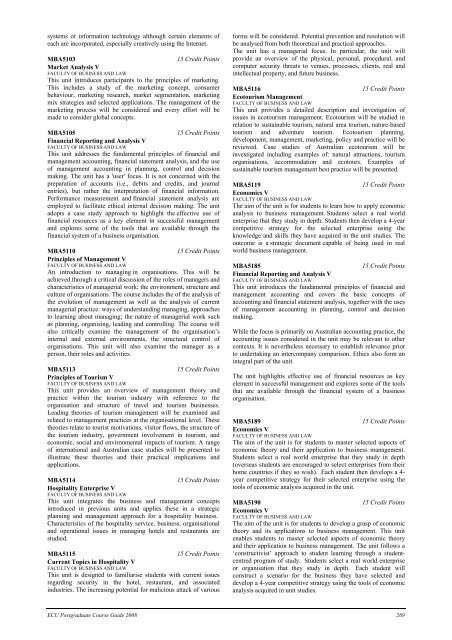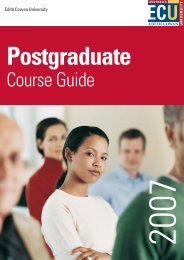Postgraduate - Edith Cowan University
Postgraduate - Edith Cowan University
Postgraduate - Edith Cowan University
Create successful ePaper yourself
Turn your PDF publications into a flip-book with our unique Google optimized e-Paper software.
systems or information technology although certain elements of<br />
each are incorporated, especially creatively using the Internet.<br />
MBA5103 15 Credit Points<br />
Market Analysis V<br />
FACULTY OF BUSINESS AND LAW<br />
This unit introduces participants to the principles of marketing.<br />
This includes a study of the marketing concept, consumer<br />
behaviour, marketing research, market segmentation, marketing<br />
mix strategies and selected applications. The management of the<br />
marketing process will be considered and every effort will be<br />
made to consider global concepts.<br />
MBA5105 15 Credit Points<br />
Financial Reporting and Analysis V<br />
FACULTY OF BUSINESS AND LAW<br />
This unit addresses the fundamental principles of financial and<br />
management accounting, financial statement analysis, and the use<br />
of management accounting in planning, control and decision<br />
making. The unit has a 'user' focus. It is not concerned with the<br />
preparation of accounts (i.e., debits and credits, and journal<br />
entries), but rather the interpretation of financial information.<br />
Performance measurement and financial statement analysis are<br />
employed to facilitate ethical internal decision making. The unit<br />
adopts a case study approach to highlight the effective use of<br />
financial resources as a key element in successful management<br />
and explores some of the tools that are available through the<br />
financial system of a business organisation.<br />
MBA5110 15 Credit Points<br />
Principles of Management V<br />
FACULTY OF BUSINESS AND LAW<br />
An introduction to managing in organisations. This will be<br />
achieved through a critical discussion of the roles of managers and<br />
characteristics of managerial work; the environment, structure and<br />
culture of organisations. The course includes the of the analysis of<br />
the evolution of management as well as the analysis of current<br />
managerial practice: ways of understanding managing, approaches<br />
to learning about managing; the nature of managerial work such<br />
as planning, organising, leading and controlling. The course will<br />
also critically examine the management of the organisation’s<br />
internal and external environments, the structural control of<br />
organisations. This unit will also examine the manager as a<br />
person, their roles and activities.<br />
MBA5113 15 Credit Points<br />
Principles of Tourism V<br />
FACULTY OF BUSINESS AND LAW<br />
This unit provides an overview of management theory and<br />
practice within the tourism industry with reference to the<br />
organisation and structure of travel and tourism businesses.<br />
Leading theories of tourism management will be examined and<br />
related to management practices at the organisational level. These<br />
theories relate to tourist motivations, visitor flows, the structure of<br />
the tourism industry, government involvement in tourism, and<br />
economic, social and environmental impacts of tourism. A range<br />
of international and Australian case studies will be presented to<br />
illustrate these theories and their practical implications and<br />
applications.<br />
MBA5114 15 Credit Points<br />
Hospitality Enterprise V<br />
FACULTY OF BUSINESS AND LAW<br />
This unit integrates the business and management concepts<br />
introduced in previous units and applies these in a strategic<br />
planning and management approach for a hospitality business.<br />
Characteristics of the hospitality service, business, organisational<br />
and operational issues in managing hotels and restaurants are<br />
studied.<br />
MBA5115 15 Credit Points<br />
Current Topics in Hospitality V<br />
FACULTY OF BUSINESS AND LAW<br />
This unit is designed to familiarise students with current issues<br />
regarding security in the hotel, restaurant, and associated<br />
industries. The increasing potential for malicious attack of various<br />
forms will be considered. Potential prevention and resolution will<br />
be analysed from both theoretical and practical approaches.<br />
The unit has a managerial focus. In particular, the unit will<br />
provide an overview of the physical, personal, procedural, and<br />
computer security threats to venues, processes, clients, real and<br />
intellectual property, and future business.<br />
MBA5116 15 Credit Points<br />
Ecotourism Management<br />
FACULTY OF BUSINESS AND LAW<br />
This unit provides a detailed description and investigation of<br />
issues in ecotourism management. Ecotourism will be studied in<br />
relation to sustainable tourism, natural area tourism, nature-based<br />
tourism and adventure tourism. Ecotourism planning,<br />
development, management, marketing, policy and practice will be<br />
reviewed. Case studies of Australian ecotourism will be<br />
investigated including examples of: natural attractions, tourism<br />
organisations, accommodation and ecotours. Examples of<br />
sustainable tourism management best practice will be presented.<br />
MBA5119 15 Credit Points<br />
Economics V<br />
FACULTY OF BUSINESS AND LAW<br />
The aim of the unit is for students to learn how to apply economic<br />
analysis to business management. Students select a real world<br />
enterprise that they study in depth. Students then develop a 4-year<br />
competitive strategy for the selected enterprise using the<br />
knowledge and skills they have acquired in the unit studies. The<br />
outcome is a strategic document capable of being used in real<br />
world business management.<br />
MBA5185 15 Credit Points<br />
Financial Reporting and Analysis V<br />
FACULTY OF BUSINESS AND LAW<br />
This unit introduces the fundamental principles of financial and<br />
management accounting and covers the basic concepts of<br />
accounting and financial statement analysis, together with the uses<br />
of management accounting in planning, control and decision<br />
making.<br />
While the focus is primarily on Australian accounting practice, the<br />
accounting issues considered in the unit may be relevant to other<br />
contexts. It is nevertheless necessary to establish relevance prior<br />
to undertaking an intercompany comparison. Ethics also form an<br />
integral part of the unit.<br />
The unit highlights effective use of financial resources as key<br />
element in successful management and explores some of the tools<br />
that are available through the financial system of a business<br />
organisation.<br />
MBA5189 15 Credit Points<br />
Economics V<br />
FACULTY OF BUSINESS AND LAW<br />
The aim of the unit is for students to master selected aspects of<br />
economic theory and their application to business management.<br />
Students select a real world enterprise that they study in depth<br />
(overseas students are encouraged to select enterprises from their<br />
home countries if they so wish). Each student then develops a 4year<br />
competitive strategy for their selected enterprise using the<br />
tools of economic analysis acquired in the unit.<br />
MBA5190 15 Credit Points<br />
Economics V<br />
FACULTY OF BUSINESS AND LAW<br />
The aim of the unit is for students to develop a grasp of economic<br />
theory and its applications to business management. This unit<br />
enables students to master selected aspects of economic theory<br />
and their application to business management. The unit follows a<br />
‘constructivist’ approach to student learning through a studentcentred<br />
program of study. Students select a real world enterprise<br />
or organisation that they study in depth. Each student will<br />
construct a scenario for the business they have selected and<br />
develop a 4-year competitive strategy using the tools of economic<br />
analysis acquired in unit studies.<br />
ECU <strong>Postgraduate</strong> Course Guide 2008 269



